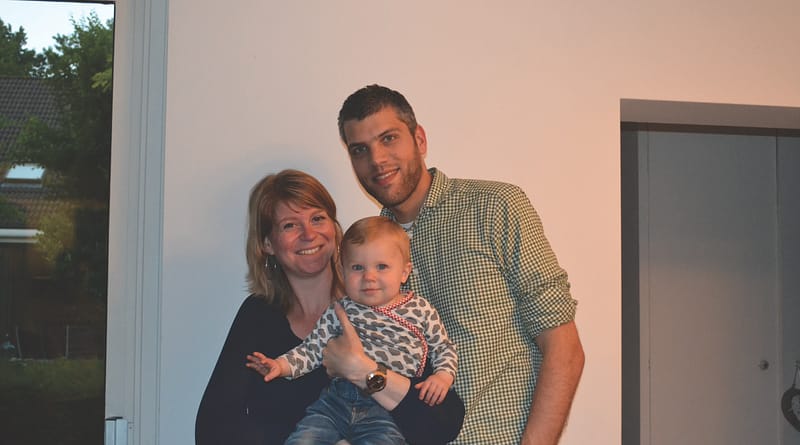Interview with Mark Timmermans and Celine Netten
Mark Timmermans and Celine Netten were both in the Asset | Econometrics board 2006 – 2007. Just before their daughter’s first birthday, we wondered: how did these two board members end up together in the first place? How do they look back upon their years at Asset | Econometrics? And what is it like to be the proud parents of an Asset | Econometrics baby? We traveled to Uden to find out.
Let me start with you, Celine. You were editor in chief of the Nekst in 2005-2006. Do you still read Nekst when you receive it?
C: “Yes, I still read some parts of it, mostly the information about the association in itself, or about companies that might interest me.”
What has changed about Nekst since you were editor in chief?
C: “Not a lot has changed in fact. Of course every new editor in chief changes the layout of the magazine, either because he/she feels it is completely outdated or even just because it is fun to give Nekst your own personal touch. However, the content never really changes: it is always about the association, about its activities and its members and about companies.”
Was it logical for you to become treasurer of the board in the year after?
C: “Yes, I have never seen myself as a real beta or alpha. I loved being editor in chief but I also thoroughly enjoyed being treasurer and learning skills like bookkeeping. Both fit me equally well.”
Why did both of you decide to apply for the Asset | Econometrics board?
M: “Our reasons are probably not that different from the reasons the current board would give you. We were both active. I had done the ‘External affairs’ committee and liked the contact with companies, so the board was an obvious next step.”
C: “During the first two years of my studies, I actually thought TEV (previous name of Asset | Econometrics, ed.) was a bit lame. Nonetheless, I decided to join the International Business Tour to Istanbul and had a great time. That is where I was convinced to become active. As editor in chief of Nekst, I spent a lot of time at the TEV rooms and went to more drinks, so I got more familiar with the association and that is when I decided I would like to apply for a board year.”
What was the greatest moment during your board year?
Mark starts to giggle and excuses himself to make the baby a bottle.
C: “I think the Active Members’ Weekend was the best time of the year, it was one big party. Mark will probably say when we started dating.”
M: “Well of course. But also, I am obliged to say that I loved the Congress. I was the chairman of the Congress committee, because of my function in the board. Asset | Econometrics does not host congresses anymore, but it was basically a full day with many different speakers. The theme was Transport&Logistics in my year. It was hard to find sponsors in that sector, but we managed to use some of the profit from another event. The point is, the committee works towards this day for almost a year. I got to say the opening and closing word and all in all it was quite the experience. I also started the National Econometricians’ Day committee towards the end of my board year; that was a great challenge as well but of course I was not able to finish the committee. After my board year, I stayed as an advisor to the committee. It was incredible to build this whole event from scratch, to choose a location (the Evoluon in Eindhoven) and make all types of arrangements for this day.”
C: “That was one of the highlights of course. I also enjoyed being in the former Drinks&Activities committee. The preparation for the Sinterklaas drink and all the fun we had in advance comes to mind, we dressed up as Zwarte Piet and walked through Tilburg in costume and make-up, it was great fun. The etiquette dinner we hosted during our board year, at the Orangerie, also stands out.”
M: “Though not one moment, I would like to say I really enjoyed our board meetings.”
C: “We were always late and took forever, sometimes the rooms did not open until 12.00 o’clock, but we loved every minute of it.”
What is the most significant skill you learned during your board year?
M: “Definitely planning and organizing. I was never very structured, but I was forced to plan during that year because I had multiple committees. Not only did I get better throughout the year, it also helped me to start my study again with more zest and I was better equipped to plan my study time. I also met more hardworking students who motivated me.”
C: “As a treasurer, I learned bookkeeping of course, but I also loved the contact with different companies. A board year is like a little sneak peek into the working world, you get the see how things are done professionally, how to handle both internal and external contacts.”
By the time this Nekst hits your door mat, the 36th board of Asset | Econometrics will have been announced. What advice would you like to give them?
C: “Have a lot of fun! By the time you start working, your life will be a lot more serious and structured, so enjoy the freedom that you have now.”
M: “I would say that too. And try things, change things that have just been changed; it is okay if it does not work out because then you have learned from it. A board year is also about discovering yourself and what you are good at.”
Mark just mentioned that you got in a relationship during your board year. How did this go and how did this affect you?
M: “The spark first kindled during the handover weekend. We flirted and started a relationship soon after. It was a little scary to tell the rest of our board, but thankfully nobody objected.”
C: “We often had different points of view during board meetings, so we did not side with each other just because we were in a relationship, I think that helped.”
What is great and what is hard about being in a relationship with another econometrician?
M: “I like that she understands what I do. It is easier to explain what you are currently working on at your job and get some advice on issues you are dealing with. We both did the ORMS master, but our jobs are fairly different. I am the bigger nerd, haha. There are no downsides, in my point of view.”
C: “My line of work is purchasing, so I do not use many of my econometric skills nowadays. We can discuss our jobs of course, but it is not like we talk about econometrics all day, thankfully.”
M: “Another advantage is that we know each other’s friends. We were in different years, so we both have our own group of friends but of course we all know each other.”
Can you tell us more about your jobs?
M: “I work at TNT Express. I am a Strategic Supply Chain Development Project Manager and it is my job to manage or participate in projects that impact the structure of our European Road Network. I also work together with Ortec, who create most of the tools and models for us that support me to find optimization opportunities. I did my internship here and was offered a job, so I stayed there ever since. My work concerns our European network: where to create new lines and how to optimize the network. We have about 6000 international truck movements per week, so you can imagine that this is quite a large problem to tackle.”
C: “I work at Philips Healthcare. My official title is Program Manager Operational Procurement, which, as you might expect, has almost nothing to do with econometrics. I started here after Amber was born and I enjoy it very much. My job includes purchasing, communicating with suppliers and keeping the right inventory levels, as well as improvement projects in my department. After my study, I started as a software consultant for an energy company. That was a more econometric job that required me to program and use models, but my current job is a better fit for me.”
How did your experience at Asset | Econometrics prepare you for the working life?
M: “It is actually the other way around if you ask me: I think you have really missed something if you did not undertake any extracurricular activities during your study. You miss out on a lot of personal development. It is too bad that it becomes harder and harder for students to do things beside their studies.”
C: “Like I said, you get a sense of what it is like to work, have company contacts and you learn how to work, meet and discuss efficiently.”
M: “For instance, you cannot discuss everything you do with your fellow board members: there simply is not enough time during board meetings. You have to make choices, deal with the easy situations yourself and discuss only what needs more attention. That is similar to what you would do at your job: you do not go up to your boss and tell him or her exactly what you have done today, you ask for help whenever you need it.”
And now you are the proud parents of Amber Sofie. Is she the first Asset | Econometrics baby?
C: “We think so, we have not heard of any others anyway.”
M: “Our fellow board members used to joke that we should make a TEV baby and call it Stef.”
C: “Thankfully she is a girl, haha.”
She is obviously genetically ‘burdened’ with the econometrician-gene. Would you like it if she studied econometrics too?
C: “It does not matter, we will see.”
Would you like to tell us a little bit more about Amber?
M: “All the cliché’s are true. Having a baby is great, but it also dramatically changes your life. We just went on a holiday to Portugal and that was quite different from going on a holiday as a couple.”
C: “Amber is ten months now and she is starting to babble a little and she can crawl and stand up, with a little support. It is very ‘gezellig’ to have her around.”
M: “And many econometricians came to see the baby when she was born, that was lovely.”
We would like to thank Mark, Celine and Amber for the interview and we wish you the best of luck!




